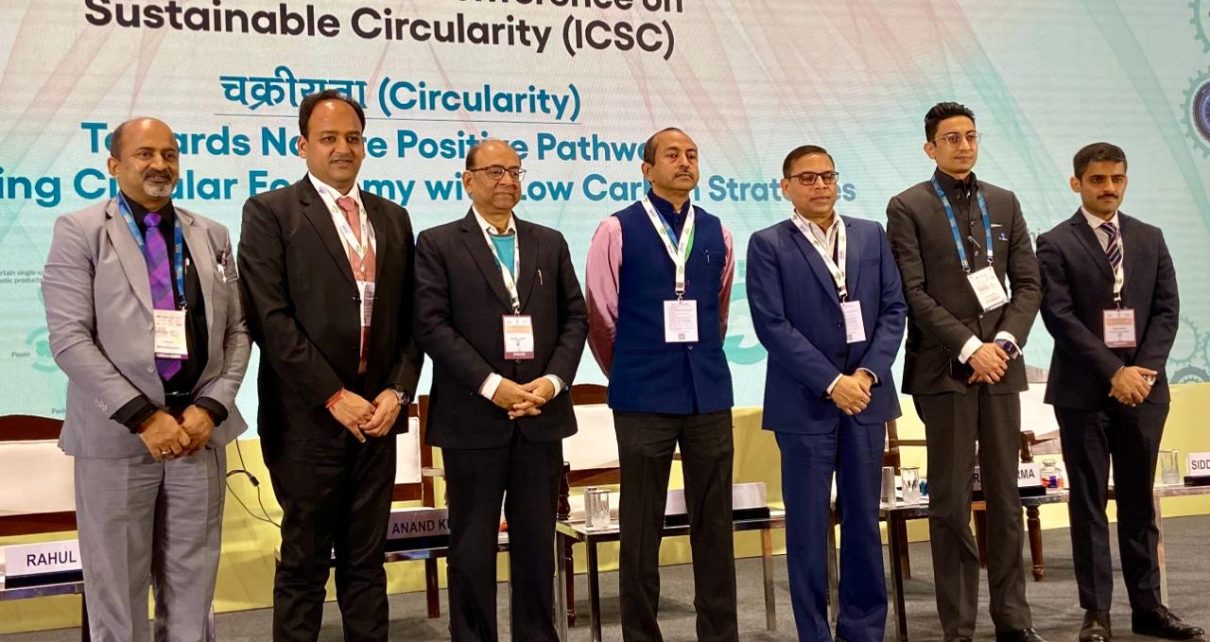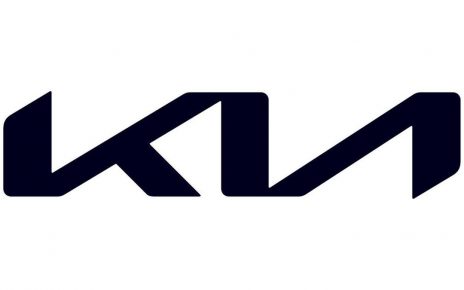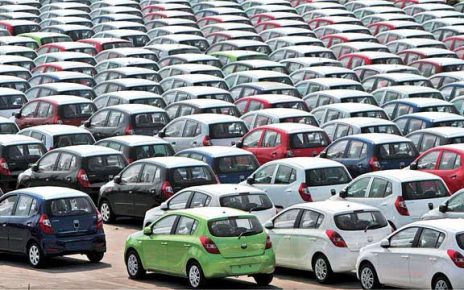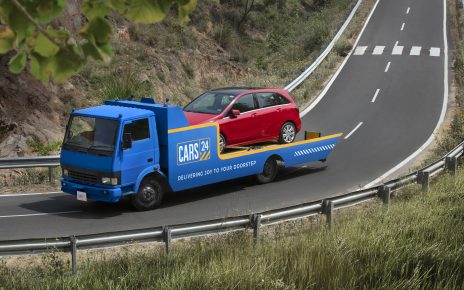Society of Indian Automobile Manufacturers (SIAM), the apex automotive industry body, under its चक्रीयता (Circularity) initiative, organized the 2nd edition of International Conference on Sustainable Circularity (ICSC), themed “Towards Nature Positive Pathway: Embracing Circular Economies with Low Carbon Strategies” on the last day of the Bharat Mobility Global Expo 2024. In accordance with the initiative’s goal of promoting the circular economy, this conference aimed at bringing together industry stakeholders and government representatives at the highest level to deliberate on pathways to an automotive circular economy in India.
In alignment with the conference’s theme, the event commenced with the Hon’ble Chief Guest, Mr. Arvind Nautiyal, Joint Secretary & Member Secretary, Commission for Air Quality Management (CAQM), along with other esteemed dignitaries unveiling the Context Paper titled “Gas Based Mobility: Fuelling India’s Economy”. This paper centers on the sustainable gas-based vehicular fuel Compressed Bio Gas (CBG) derived from recycling biomass/waste.
The inaugural session was themed “Vision for Fostering Nature Positive Circularity Principles in Automotive Sector: Policy & Regulatory Framework”. Welcoming the audience at the conference, Mr. Prashant K Banerjee, Executive Director, SIAM, said, “SIAM is dedicated to building the nation responsibly and contributing to India’s ambitious goal of becoming a developed nation by 2047. Through the चक्रीयता (Circularity) initiative, we are steadfast in our commitment to reduce the auto industry’s carbon footprint and to cultivate a sustainable future for the next generation.”
On the occasion, Hon’ble Chief Guest, Mr. Arvind Nautiyal, Joint Secretary & Member Secretary, CAQM, expressed, “Phasing out old vehicles, combined with incentives for scrapping, and hazardous waste management have to be dovetailed into material circularity policies.”
Mr. Sharath Kumar Pallerla, Advisor, MoEF&CC, highlighted, “India, with 18% of the global population, emits only 5% of global emissions due to the circularity ingrained in our culture. However, we must augment our efforts towards embracing circularity principles to ensuring a harmonious balance between our economic developmental actions and environmental responsibility.”
Mr. Ashish Chutani, Head Government Affairs & Relationships, Maruti Suzuki, highlighted, “The success of India’s sustainable mobility vision hinges on embracing three pivotal strategies: Scrappage, Circularity, and EPR.”
Mr. Sanjay Mehta, President, MRAI, said, “Creating the circular economy depends on 6Rs—reduce, reuse, recycle, recover, redesign, and remanufacture. Our commitment should include embracing these 6Rs and encouraging at least one-thirds of recyclable material in production.”
The session further included theme presentations by Mr. David Nolan, Executive Director, Auto Recyclers Association of Australia and Ms. Anuradda Ganesh, Chief Technical Advisor, Cummins followed by the concluding remarks from Mr. M S Anandkumar, Chairman, SIAM Recycling and Material Group.
Technical session 1, themed “Closing the Loop: Criticality of Extended Producer Responsibility in ELV Recycling”, was chaired by Mr. Bharat Sharma, Member Secretary, CPCB on Policy Perspective and Recycling Portal Management.
The session included thematic presentations from Mr. Siddarth Bapna, Co-founder & Director, Blue Verse on “Introduction to India’s first Sustainable and Automated vehicle washing solution”, and Mr. Rahul Gupta, Chief Steel Recycling Business, Tata Steel.
Mr. Bharat Sharma, Member Secretary, CPCB on Policy Perspective and Recycling Portal Management, said, “The surge in registration requests on the EPR Portal is encouraging. It’s heartening to witness that producers and recyclers are earnestly embracing EPR obligations and actively working to reduce and recycle waste.”Top of Form
Mr. Sajiv, said, Joint Secretary, DPIIT, said, “Thoughtful consumption is key to achieving sustainability goals and we must adopt environment-friendly habits. Making the mobility sector sustainable requires effective implementation of EPR and recycling strategies that can pave the way for swift transition towards a greener and responsible future.”
Mr. Ashim Sharma, Senior Partner & Group Head, NRI Consulting & Solutions, said, “The automotive sector is swiftly adopting recycling practices, and the success of recycling policies is attributed to consumer incentives and extended producer responsibility. These strategic initiatives are proving instrumental in steering the industry towards a more sustainable and environmentally conscious future.”
Technical Session 2, themed ‘Recycling Resources for a Sustainable Future: Power of Reduce-Reuse-Recycling (3Rs) Principle in the Automotive Sector’, was chaired by Mr. V K Misra, Chairman, ITTAC. The session included thematic presentation from Mr. Rajat Verma, CEO, Lohum Cleantech, on “Sustainable Critical Minerals for Net-zero”, Mr. Vinod Babu, Director, CPCB on “ELV Handling & Management: Policies and Best Practices”, Mr. Navin Sharma, Executive Director, Gravita India, on “Material Recycling Technologies: Innovations in Driving Sustainability across the Automotive Sector”, Mr. Shantanu Gupta, Executive Director, IOCL, Mr. Ved Prakash Mishra, Director, MoEF&CC, on “Policy and Regulatory Regime for E-waste Management in India”, and Mr. Anant Bhargava, CEO & Director IFP Petro, on “Best Practices: Lessons Learned from Successful Cases of Used Oil Recycling”.
Mr. V K Misra, Chairman, ITTAC, said, “With a growing population and limited resources, it’s imperative to take concrete measures towards sustainability. Adopting and implementing the Circularity principle is critical to ensure responsible resource management which will serve as a resilient foundation for the future.”
Dr. Rashid Hasan, Senior Advisor, SIAM, said, “Embracing Circularity involves three key elements: Collection & segregation, the 3Rs, and EPR. Equally important is understanding the potential applications of recycled materials.”
Technical Session 3, themed ‘Innovative ELV Recycling for Sustainability: Resource Conservation & Green Growth’, was chaired by Mr. Manish Mathur, Partner (Asia Automotive), Kearney, who also gave a thematic presentation. The other thematic presentations were from Dr. Arun Jaura, Chief Technology Officer (CTO), Hero MotoCorp, Ms. P Bineesha, Advisor-MRAI and Executive Director, IIWM, on “Operationalising Circular Economy in ELV Recycling Units”, Mr. Masaru Akaishi, Managing Director, Maruti Suzuki Toyotsu India Pvt Ltd, on “Sustainable Materials Recovery from ELVs: From Challenge to Opportunity”. Mr. Kartick Nagpal, President, Rosmerta Group, spoke on “Implementing Extended Producer Responsibility (EPR) in the Auto Industry: Challenges and Solutions at RVSF Level”.
Mr Vijay Prakash Yadav, Director, CPCB, said, “We have covered producers and recyclers in the EPR but the responsibility extends to the larger people.” In his concluding remark, Mr. Prashant K Banerjee, Executive Director, SIAM, summarised the ideas of the session focussing on innovative End-of-Life Vehicle (ELV) recycling methods, resource conservation and fostering green growth.
The successful organization of the 2nd edition of ICSC showcased SIAM’s commitment to promoting circularity in the automotive sector in order to facilitate India’s move towards sustainable mobility. The event concluded on a high note, facilitating a rich and insightful exchange of ideas, best practices, and strategies. SIAM also created a Circularity Pavilion at the expo alongside this conference.



